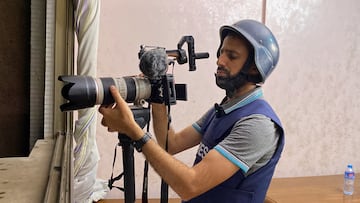What are the dangers of being a journalist in a warzone like Gaza?
Journalists reporting in the world’s most dangerous areas must dodge bullets and bombs to report to the world distressing events.


With Gaza under assault and the recent announcement from the Israeli army to evacuate Gaza City, Palestine is without a doubt the most dangerous place in the world right now.
Documenting the plight of the Palestinians forced to flee homes turned to rubble, journalists have been thrust into harms way with little by the way of safety. With no power or electricity in Gaza, getting the pictures of the devastation out to the world is key for ensuring countries are held accountable for potential crimes.
The dangers faced by journalists
Journalists can be at as much risk as the civilians they are documenting. In areas like Gaza, where there is no escape for anyone involved, the population and journalists are a moment away from the building they are in being destroyed from under them. As of Friday, at least ten journalists have been killed, two injured, and two missing in Gaza.
Reporters increase their own personal risk to get the story. War photographer Robert Capa said, “If your picture isn’t good enough, you’re not close enough,” with a clear example below of BBC reporter Jeremy Bowen dashing across Mostar Bridge during the Yugoslav wars.
It was a shocking moment. The guy in the blue flak jacket in the video below is me. Spotted by the always razor sharp @zeynep_erdim https://t.co/yILuNgcQZl
— Jeremy Bowen (@BowenBBC) November 9, 2020
Other examples include Marie Colvin. She lost an eye to a rocket propelled-grenade in 2001 and was killed in Syria in 2012, allegedly targeted by the Syrian government.
Like everyone in warzones, post-traumatic stress is rife. According to the US Department for Veteran Affairs (VA), the PTSD rate in war journalists is 28.6% while the rate of depression is 21.4%, far exceeding the rates of the US population. They are not well compensated for the dangers that they face in the line of work.
Nor is there justice for those journalists killed. The Committee to Protect Journalists published a report last year that found that nearly 80% of cases in which journalists are killed are not solved.
“We’ve seen cases of journalists killed in countries with total impunity, with no significant improvement in the protection of journalists and no efforts to protect journalists,” says Martínez de la Serna, program director at the Committee to Protect Journalists.
So why is it so important that journalists can do their job?
Related stories
“Journalists and freedom of the press are a big pillar in democracy,” says Raoul Junior Lorfils a journalist in Haiti. “If there are no journalists, the people will not have access to the useful information they need to guide their democratic decisions.”
Without the images and stories out of warzones, the public do not know the conditions faced by the world’s downtrodden. It gives people the opportunity to evaluate world events for themselves, and act accordingly.
